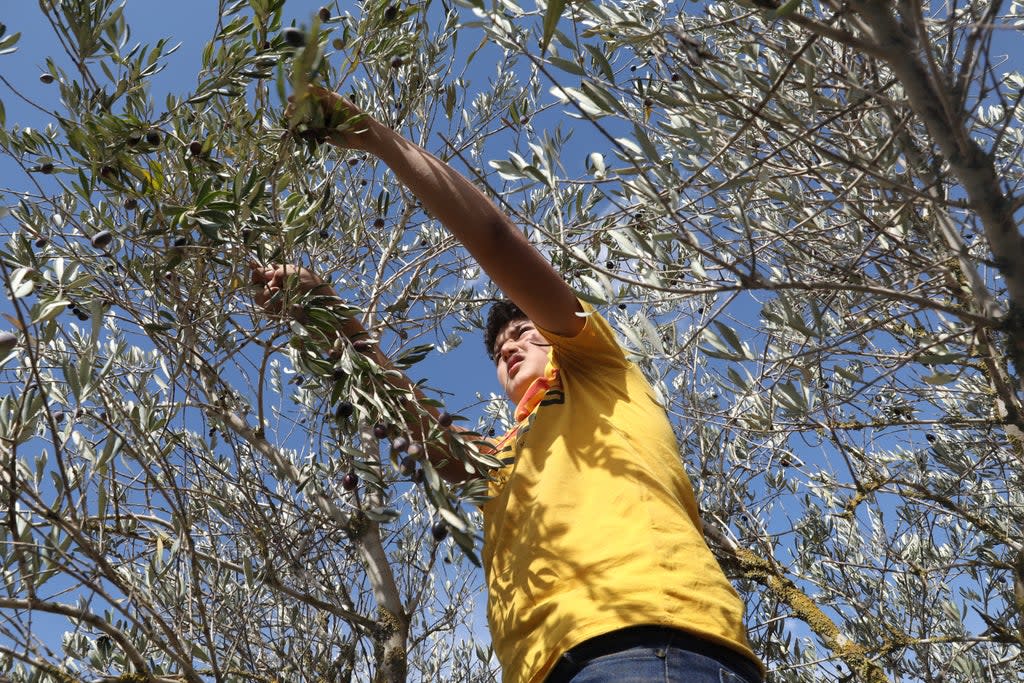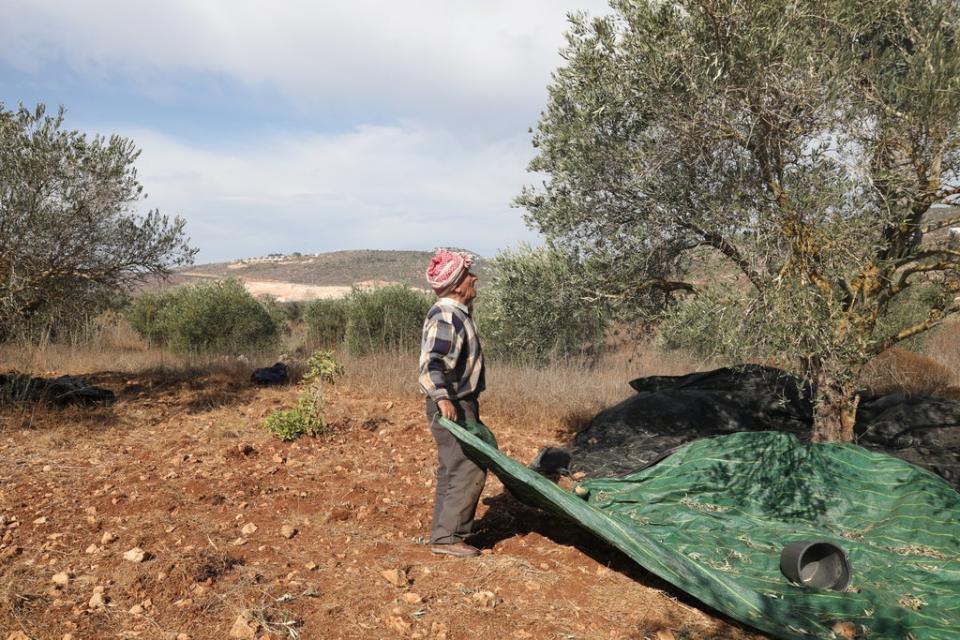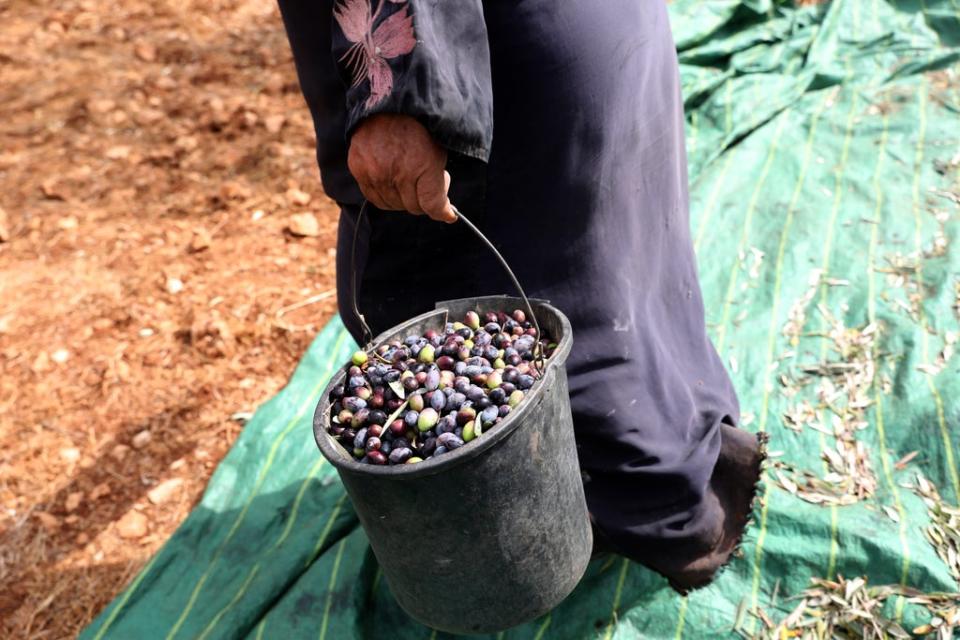Wielding saws, shears and shovels, Israeli settlers ramp up attacks on Palestinians during olive harvest

During this year’s olive harvest, the Israeli settlers came four times for the Palestinian farmer’s trees: first with chemical plant killer, then armed with shears and saws, and finally, wielding shovels.
They destroyed more than 100 trees located on land in the occupied West Bank that Sulaiman al-Jaafreh’s family has farmed for over a century. Some of the trees were completely uprooted and so the family hurriedly planted more, fearing that the settlers would seize the land and claim it was unoccupied.
“These attacks are unprecedented this year in terms of the frequency and the level of violence,” Sulaiman tells The Independent in desperation.
“They came in the middle of the night, sometimes with dogs.”
This year’s harvest – which started in October – has seen a surge in attacks by Israeli settlers on Palestinian olive farms with dozens of incidents reportedly recorded by Israeli authorities and documented by an Israeli rights group.
Yet instead of trying to prevent the violence, activists say the state is using it as a “tool” to drive Palestinians from farming and pasture lands in the occupied West Bank.
The Israeli authorities strongly deny this, and the military told The Independent it is “committed to the well-being of all residents in the area and acts to prevent violence within its area of responsibility.”
Watch: Boris Johnson says Israel has right to defend itself ‘for the sake of peace’
Nonetheless, the recent violence has been so serious that the Israeli security forces themselves sounded the alarm last month, reportedly telling Army Radio that there has been a 60 per cent rise in violent attacks by extremist settlers in comparison to 2020, which was already a bad year.
Defence minister Benny Gantz also convened an emergency meeting recently with senior figures of the security establishment to discuss the steep rise in incidents. Data compiled by the United Nations Office for the Coordination of Humanitarian Affairs (UNOCHA)shows that since the start of the olive harvest, people known or believed to be settlers have damaged or stolen the harvest from over 2,000 trees.
Sulaiman, a father of six, explained that his plot of land is adjacent to the hilltop Israeli settlement of Adora, which according to the UN was created in 1982. Other parts of his family land are inaccessible as they are also located within the settlement.
“There are pro-settlement organisations inciting the settlers and even bussing people into some areas,” he said.
“They tried to burn the same patch of land last year. This is to destroy our livelihoods and force us to leave so they can say this land has no people on it. We complained to the Israeli police and they said ‘There is nothing we can do about it’.”

In the 1967 Six-Day War, Israel captured the West Bank, which is home to almost 3 million Palestinians.
There are now about 500,000 Israeli settlers living there, in settlements that are deemed illegal under international law and seen as an obstacle to peace by much of the global community. Some more radical settlers have set up dozens of outposts, often in rural areas, that even contravene Israeli law.
Israeli soldiers patrol the West Bank, but the Israeli police are in charge of dealing with violations of the law and complaints filed by Palestinians regarding the illegal use of their private lands by Israelis.
According to the UN, the number of incidents of settler violence resulting in Palestinian casualties has risen year-on-year since 2016.
The olive harvest has become a miserable focal point of the violence.
It is a revered cultural emblem and economic necessity for the Palestinians; as many as 100,000 families rely on it for income.
But every year the farmers face various threats from settlers, including intimidation and physical assaults, destruction, uprooting and vandalism of their olive trees, theft of crops and harvesting tools.
Watch: Stop toxic travel curbs, begs S. Africa president
Compounding their woes, rights groups say that Palestinian farmers such as Sulaiman also have trouble accessing their lands at great cost.
Data from the International Committee of the Red Cross (ICRC) shows that between August 2020 and August this year, more than 9,300 trees were destroyed in the West Bank.
But violence during this year’s harvest appears to have soared.
They not only attacked trees but women and children in their housesZaid, Wall and Settlement Resistance Commission
Israeli rights group B’tSelem, which monitors attacks across the occupied West Bank and Jerusalem, said it had documented 41 incidents directly related to the harvest so far this year: the same figure they recorded for the whole of 2020.
“This is as far as we know. We don’t know if we have documented everything,” adds Roy Yellin, a spokesperson for the group.
According to Israeli media, security forces logged 67 Israeli attacks on Palestinian farmers during this year’s harvest, up from 42 in 2020.
The situation was so dire that Mr Gantz called a high-level meeting earlier this month which included the head of the Shin Bet security service, the commissioner of the police and the head of the central command, Israeli media then reported. He later urged the military to intervene.
The Israeli army told The Independent that it “invests a great deal of effort to prevent violent incidents in the area, and is in direct contact with the various security forces in these areas.” It said it works in coordination with the police and civil administration to maintain “public order” for the harvesters.
But Palestinian and Israeli rights groups have accused the Israeli security forces of deliberately turning a blind eye or ignoring violence as part of a state plan to secure more land in the coveted West Bank, which the Palestinians see as integral to their future state.
This is vehemently denied by the military who told The Independent “any claim that the [army] supports or permits residents violence is false.”
However, B’Tselem said in a report released this month that settler violence is a “major informal tool” to drive Palestinians from farming and pasture lands.
It detailed the takeover of nearly 30 square kilometres of farmlands and pastures over the past five years, which is around half the size of the island of Manhattan in New York.

"When the violence occurs with permission and assistance from the Israeli authorities and under its auspices, it is state violence. The settlers are not defying the state; they are doing its bidding," the organisation said.
For years rights groups, the UN and even foreign embassies have organised teams of volunteers to accompany the Palestinian farmers, forming a protective presence to deter potential settler attacks.
For example, a delegation from the British embassy joined olive farmers in the Nablus district this year and afterwards, British consul-general Diane Corner urged Israel to hold the settlers responsible for the violence to account.
Zaid works for the Wall and Settlement Resistance Commission (WSRC), a Palestinian organisation that documents settler attacks and accompanies farmers during the harvest.
He said this year saw an increased level of organisation, with extremist groups such as Hilltop Youth bussing in settlers from the north to the south. Security forces did nothing to stop them, added Zaid, who did not give his full name.
“These attacks are systemic and planned. In areas like Yatta [near Hebron], they were coming in buses. They not only attacked trees but women and children in their houses,” he said, calling on the international community to protect Palestinian lands.
“We need pressure on Israeli government who are continuing to build and expand settlements which are illegal in the West Bank.”
For Sulaiman, the damage has already been done.
He has managed to get help securing more seedlings and plants from international aid funds to try to rebuild his lands, but has little confidence that they won’t be destroyed in the future.
“All of this help is ineffective if these attacks are not stopped – they can only be stopped by the Israeli security forces,” he says forlornly.
“We have lodged so many complaints and the police do nothing. And so we can only see this as systematic.”
Read More
Nearly 20 years on, Israeli barrier shapes Palestinian lives
Israel’s security forces are ‘complicit’ in drastic surge in settler violence, report finds
Israel declares Palestinian human rights groups as terrorist organisations
Waiting for war: Vigilantes patrol Ethiopia’s capital as conflict intensifies
Pulitzer prize-winner who fled the Taliban urges the west to resettle Afghan refugees
Singapore death penalty for drug crimes under scrutiny as smuggler awaits his fate

